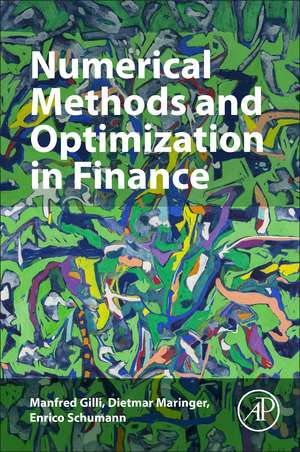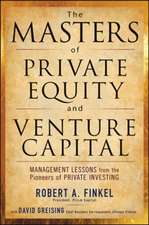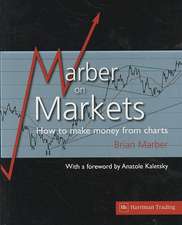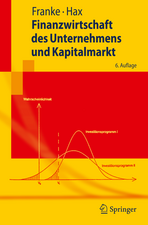Numerical Methods and Optimization in Finance
Autor Manfred Gilli, Dietmar Maringer, Enrico Schumannen Limba Engleză Paperback – 15 aug 2019
This revised edition includes two new chapters, a self-contained tutorial on implementing and using heuristics, and an explanation of software used for testing portfolio-selection models. Postgraduate students, researchers in programs on quantitative and computational finance, and practitioners in banks and other financial companies can benefit from this second edition of Numerical Methods and Optimization in Finance.
- Introduces numerical methods to readers with economics backgrounds
- Emphasizes core simulation and optimization problems
- Includes MATLAB and R code for all applications, with sample code in the text and freely available for download
| Toate formatele și edițiile | Preț | Express |
|---|---|---|
| Paperback (1) | 706.30 lei 5-7 săpt. | |
| ELSEVIER SCIENCE – 15 aug 2019 | 706.30 lei 5-7 săpt. | |
| Hardback (1) | 496.30 lei 5-7 săpt. | |
| ELSEVIER SCIENCE – 24 aug 2011 | 496.30 lei 5-7 săpt. |
Preț: 706.30 lei
Preț vechi: 889.53 lei
-21% Nou
Puncte Express: 1059
Preț estimativ în valută:
135.15€ • 141.40$ • 112.27£
135.15€ • 141.40$ • 112.27£
Carte tipărită la comandă
Livrare economică 27 martie-10 aprilie
Preluare comenzi: 021 569.72.76
Specificații
ISBN-13: 9780128150658
ISBN-10: 0128150653
Pagini: 638
Dimensiuni: 216 x 276 mm
Greutate: 1.46 kg
Ediția:2
Editura: ELSEVIER SCIENCE
ISBN-10: 0128150653
Pagini: 638
Dimensiuni: 216 x 276 mm
Greutate: 1.46 kg
Ediția:2
Editura: ELSEVIER SCIENCE
Public țintă
Students (Master or PhD level) and researchers in programs on quantitative and computational finance, and also practitioners in banks and other financial companies.Cuprins
1. Introduction
I. Fundamentals2. Numerical Analysis in a Nutshell3. Linear Equations and Least Squares Problems4. Finite Difference Methods5. Binomial Trees
II. Simulation6. Generating Random Numbers7. Modeling Dependencies8. A Gentle Introduction to Financial Simulation9. Financial Simulation at Work: Some Case Studies
III. Optimization10. Optimization Problems in Finance11. Basic Methods12. Heuristic Methods in a Nutshell13.: Heuristic Methods: A Tutorial14. Portfolio Optimization15. Backtesting Investment Strategies16. Econometric Models17. Calibrating Option Pricing Models
I. Fundamentals2. Numerical Analysis in a Nutshell3. Linear Equations and Least Squares Problems4. Finite Difference Methods5. Binomial Trees
II. Simulation6. Generating Random Numbers7. Modeling Dependencies8. A Gentle Introduction to Financial Simulation9. Financial Simulation at Work: Some Case Studies
III. Optimization10. Optimization Problems in Finance11. Basic Methods12. Heuristic Methods in a Nutshell13.: Heuristic Methods: A Tutorial14. Portfolio Optimization15. Backtesting Investment Strategies16. Econometric Models17. Calibrating Option Pricing Models
Recenzii
"This book aims at providing guidance which is practical and useful for practitioners in finance with emphasis on computational techniques which are manageable by modern day desktop personal computers’ processing power when building, testing, comparing and using mathematical and econometric models of finance in the pursuit of analysis of actual financial market data in day to day activities of financial analysts, be they students of courses in finance programs or analysts in financial institutions." --Zentralblatt MATH 2012-1236-91001
"With as much rigor as can be mastered by anyone in the still-developing field of computational finance and a sense of humor, the authors unravel its mysteries. The presentations are clear and the models are practical --- these are the two ingredients that make for a valuable book in this field. The book is both practical in scope and rigorous on its theoretical foundations. It is a must for anyone who needs to apply quantitative methods for financial planning --- and who doesn’t need to in our days?" --Stavros A. Zenios, University of Cyprus and the Wharton Financial Institutions Center
"Numerical Methods and Optimization in Finance is an excellent introduction to computational science. The combination of methodology, software, and examples allows the reader to quickly grasp and apply serious computational ideas." --Kenneth L. Judd, Hoover Institution, Stanford University
"With as much rigor as can be mastered by anyone in the still-developing field of computational finance and a sense of humor, the authors unravel its mysteries. The presentations are clear and the models are practical --- these are the two ingredients that make for a valuable book in this field. The book is both practical in scope and rigorous on its theoretical foundations. It is a must for anyone who needs to apply quantitative methods for financial planning --- and who doesn’t need to in our days?" --Stavros A. Zenios, University of Cyprus and the Wharton Financial Institutions Center
"Numerical Methods and Optimization in Finance is an excellent introduction to computational science. The combination of methodology, software, and examples allows the reader to quickly grasp and apply serious computational ideas." --Kenneth L. Judd, Hoover Institution, Stanford University











